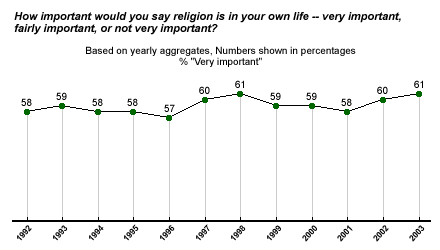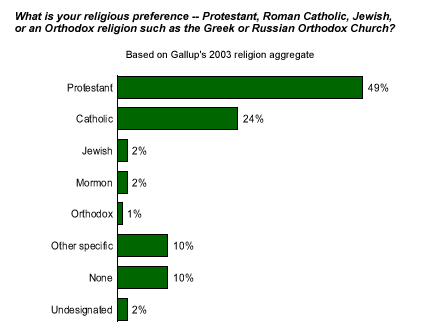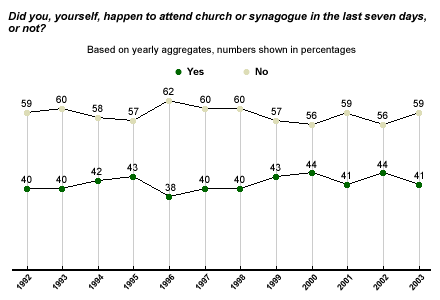


American Public Opinion About Religion
Tuesday, March 2, 2004
by Joseph Carroll
Mel Gibson's controversial new film, "The Passion of the Christ," opened last Wednesday and earned an estimated $117.5 million in its first five days of release. The film, which depicts the last 12 hours in the life of Jesus Christ, has put a renewed focus on religiosity in the United States. A Gallup review shows that the United States is a highly Christian nation, and on a relative basis remains very religious.
Religious Preference
Gallup's 2003 aggregate of more than 12,000 interviews about Americans' religious preferences shows that more than 8 in 10 Americans identify their religious preference as Christian. Nearly half of this sample of Americans interviewed in 2003, 49%, say they are Protestant, while 24% say they are Catholic. Another 10% identify with some other form of the Christian religion. Two percent of Americans report that they are Jewish. Another 2% say they are Mormon, and 1% say they are Orthodox. Ten percent of Americans say they have no specific religious preference.
Younger Americans are much more likely than older Americans are to say they have no religious preference. Sixteen percent of 18- to 29-year-olds say they have no religious preference, compared with 11% of 30- to 49-year-olds, 8% of 50- to 64-year-olds, and 4% of people aged 65 and older. Younger people are also less likely to be Protestants (36% of 18- to 29-year-olds, 47% of 30- to 49-year-olds, 57% of 50- to 64-year-olds, and 63% of people aged 65 and older are Protestant).
Importance of Religion
Roughly 6 in 10 Americans say that religion is very important in their personal lives. An additional 24% say that religion is fairly important, and 15% say it is not very important. The importance of religion to Americans has remained quite stable over the past decade, with a low of 57% saying religion was very important in 1996 and a high of 61% saying it was very important in 1998.
Religion is more important to older Americans than it is to younger Americans. Seventy-three percent of adults aged 65 and older say religion is very important, compared with 65% of 50- to 64-year-olds, 59% of 30- to 49-year-olds, and 48% of 18- to 29-year-olds.
Religion also is more important for women than men, by a margin of 69% to 51%.
Roughly two-thirds of Republicans say religion is very important, and a similar percentage of Democrats (63%) offer this response. Fifty-four percent of independents feel religion is very important to their lives.
Church Attendance
The 2003 results show that 41% of Americans say they have attended church or synagogue in the past seven days.
There are some interesting demographic differences on church attendance:
- Older people are more likely than younger people to say they have attended services in the past seven days (46% of people aged 50 and older have attended in the past seven days, compared with 40% of 30- to 49-year-olds and 30% of 18- to 29-year-olds).
- Women are more likely than men to have attended services, by a 44% to 36% margin.
- Higher-income respondents are the most likely inclined to report that they have gone to services, with 42% of people with annual household incomes of more than $75,000 reporting attendance. Thirty-seven percent of those earning less than $20,000 a year report attendance.
- Nearly half of all Republicans, 49%, have gone to church or synagogue in the past seven days, compared with 40% of Democrats and 34% of independents.
- Southerners are much more likely to report attendance than people living elsewhere, with 49% of Southerners, 39% of Midwesterners, 36% of Easterners, and 33% of Westerners saying they've attended services in the past week.
Can Religion Solve Most of Today's Problems?
Sixty percent of Americans say that religion can answer all of today's problems, while 26% of respondents in the 2003 aggregate say religion is old-fashioned and out-of-date.